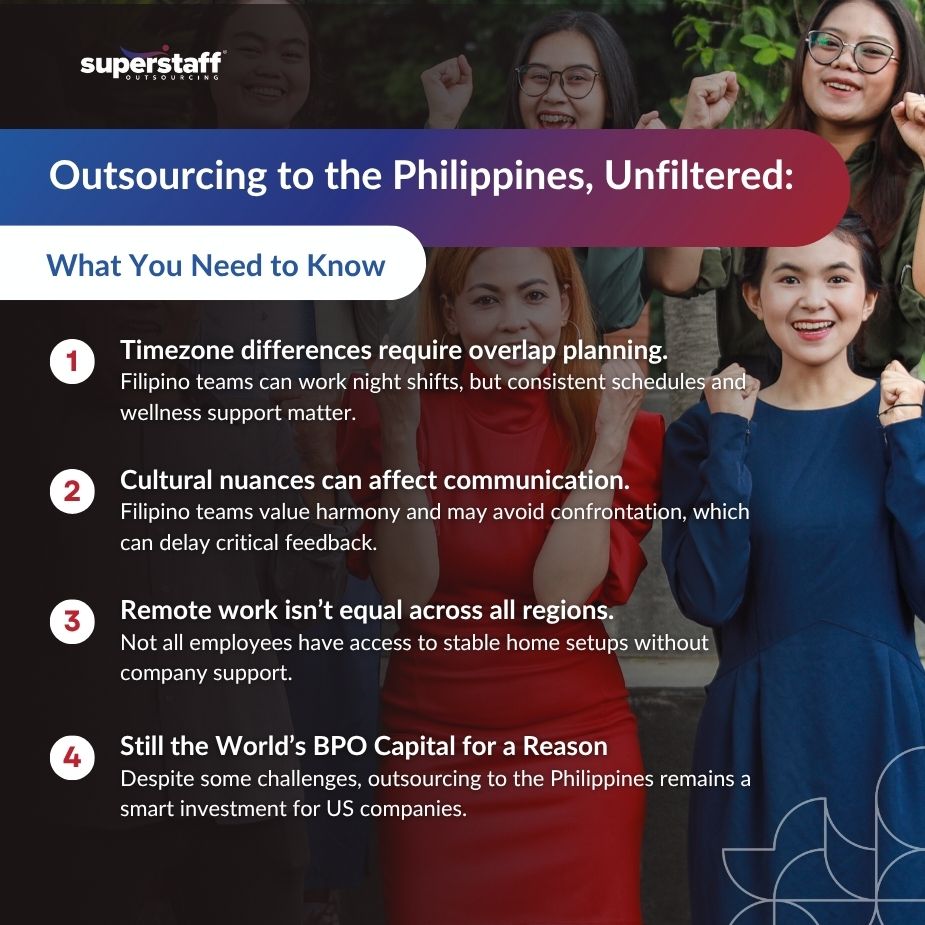
Outsourcing to the Philippines is often painted in glowing terms—but what’s the story behind the headlines? For years, the country has been hailed as a BPO success story, with glowing praise around its English-speaking workforce, cultural compatibility with Western clients, and highly competitive labor costs. These are valid strengths—but they’re only part of the picture.
While it’s true that the Philippines is one of the top outsourcing destinations in the world, most surface-level discussions rarely go beyond generic claims. Cost savings and cultural alignment dominate the narrative, leaving decision-makers with an incomplete understanding of what it really takes to succeed in the region. From infrastructure gaps in certain areas to the nuanced realities of Filipino workplace culture, there’s more to evaluate than just the bottom line.
This blog strips away the buzzwords and marketing spin to take a closer, more unfiltered look at outsourcing to the Philippines. We’ll break down the genuine advantages, expose common misconceptions, and explore the operational realities that businesses must be prepared for. Whether you’re considering your first offshore partnership or looking to scale an existing one, this honest perspective will help you make smarter, more strategic decisions.
The Philippine BPO Industry Thrives for Good Reason—But It’s Not Just About Labor Costs
The BPO industry in the Philippines is globally renowned, and for good reason. But while cost savings remain a key motivator, they only scratch the surface of what makes the country a preferred outsourcing hub.
Talent Quality and Education: The Philippines boasts a highly educated, English-fluent workforce. The country produces nearly half a million college graduates each year, many of whom specialize in business, IT, finance, and healthcare fields critical to outsourcing operations. With a literacy rate of over 90%, the workforce is not just large but also highly trainable.
Customer-Centric Culture: Filipino culture is service-oriented. This mindset is particularly valuable in customer support roles, where empathy, patience, and adaptability play a major role in customer satisfaction.
Communication and Accent Neutrality: One of the standout advantages is the neutral English accent common among Filipino professionals. This has allowed companies to seamlessly integrate Philippine-based teams into customer-facing roles without the friction that often comes with language barriers.
Digital Readiness: The youth population is highly tech-savvy, with digital skills embedded in both formal education and everyday usage. The rise of IT-BPM roles, such as data analytics and software testing, reflects this adaptability to high-demand functions.
Government Support: The Philippine government actively promotes the BPO sector through investment incentives, infrastructure funding, and skills training initiatives. Programs led by the IT and Business Process Association of the Philippines (IBPAP) continue to strengthen the industry’s global competitiveness.
Yet behind these strengths are systemic realities that businesses need to factor in.
Infrastructure and Policy Are Strong in Urban Centers—But Not All Locations Are Created Equal
While urban hubs like Metro Manila, Cebu, and Clark have world-class outsourcing infrastructure, the picture is less consistent in emerging provincial cities. As outsourcing trends in 2025 continue to push for expansion beyond traditional locations, this disparity presents real challenges for businesses seeking to scale operations more broadly across the Philippines.
Connectivity and Power Reliability: Major cities offer stable internet and power grids, essential for 24/7 BPO operations. However, provincial areas often experience internet disruptions and rotating brownouts, which can affect productivity unless mitigated with backup systems.
Policy Enforcement and Local Government Support: National-level policy supports the outsourcing industry, but its implementation varies at the local level. This inconsistency can affect the ease of doing business, particularly for companies exploring Next Wave Cities for expansion.
Remote Work Viability: The pandemic has accelerated remote work adoption, but not all regions are equally prepared. Many employees in rural areas lack access to reliable home setups, which can limit the viability of work-from-home arrangements without company-provided equipment or stipends.
This leads many companies to weigh trade-offs between cost and performance predictability.

Labor Costs May Be Lower, But Building a High-Performing Team Still Requires Investment
Outsourcing to the Philippines does provide significant cost savings compared to U.S. or European labor markets. However, maintaining quality and consistency demands strategic investment.
Hidden Costs and Productivity Gaps: Lower hourly wages don’t always equate to lower total cost. Onboarding, training, productivity ramp-ups, and attrition can quietly erode savings. High turnover, in particular, can become a drain without strong engagement and development programs.
Local Oversight and Support: Having an on-the-ground operations manager can bridge communication gaps, enforce standards, and provide real-time coaching. Companies that rely entirely on offshore operations without localized leadership may face operational silos and performance issues.
Retention and Upskilling: Investing in continuous learning, performance incentives, and clear career paths can dramatically reduce attrition and improve team effectiveness. Philippine BPO professionals respond well to structured development programs and recognition.
Beyond operations, success in the Philippines hinges on cultural understanding and leadership alignment.
Filipino Work Culture Blends Professionalism With Deep Respect—But Comes With Nuances
The Filipino workplace is characterized by a blend of Western professionalism and Eastern values of respect and harmony. Understanding these dynamics can mean the difference between friction and cohesion.
The “Yes, Po” Culture: Deference to authority is a deeply ingrained value. This can manifest as a tendency to avoid conflict or say “yes” even when issues exist. Without fostering psychological safety, businesses may miss early warning signs or feedback on operational problems.
Sensitivity to Tone and Feedback: Filipino professionals are highly responsive to respectful leadership. Abrupt or overly critical communication can demoralize teams. Effective managers in the Philippines balance accountability with empathy.
Loyalty and Community: When nurtured properly, Filipino teams are among the most loyal and collaborative. Team outings, recognition programs, and strong internal communication help build a family-like environment that enhances performance and retention.
With cultural intelligence, companies can unlock a loyal, motivated, and mission-aligned workforce.
The Philippines Is Ready to Scale With You—If You Choose the Right Partner
The success of outsourcing to the Philippines depends not just on where you go, but who you go with. Your BPO partner plays a pivotal role in ensuring alignment with your brand, goals, and operational standards.
Transparency and KPI Alignment: A reputable BPO provider will ensure real-time reporting, SLA tracking, and open communication. Avoid partners that lack dashboard visibility or brush aside performance metrics.
Scalability Through Strategic Models: A good BPO doesn’t just fill seats—it helps you grow. Look for providers that can build blended teams (onshore + offshore), adapt to seasonal fluctuations, and scale up or down without disrupting service quality.
Innovation and Continuous Improvement: The best outsourcing partners go beyond task execution. They bring process improvement ideas, leverage the latest tech (AI, analytics), and embed quality assurance into daily operations.
So what should you take away from this “unfiltered” view?
The Real Bottom Line on Outsourcing to the Philippines
Outsourcing to the Philippines can be a growth multiplier—but only if you go in informed, not idealistic.
The BPO industry in the Philippines has matured into a global leader thanks to its talent pool, service orientation, and strong government backing. But the journey isn’t without its trade-offs. The challenges of outsourcing to Filipino teams—from infrastructure gaps to cultural communication styles—require thoughtful planning and a long-term mindset.
By understanding both the hype and the hidden complexities, companies can tap into one of the world’s most dynamic outsourcing markets with clarity and confidence.
Ready to explore what outsourcing to the Philippines really looks like when done right? Partner with SuperStaff to get both the strategic edge and the on-the-ground insight that turns hype into results.






